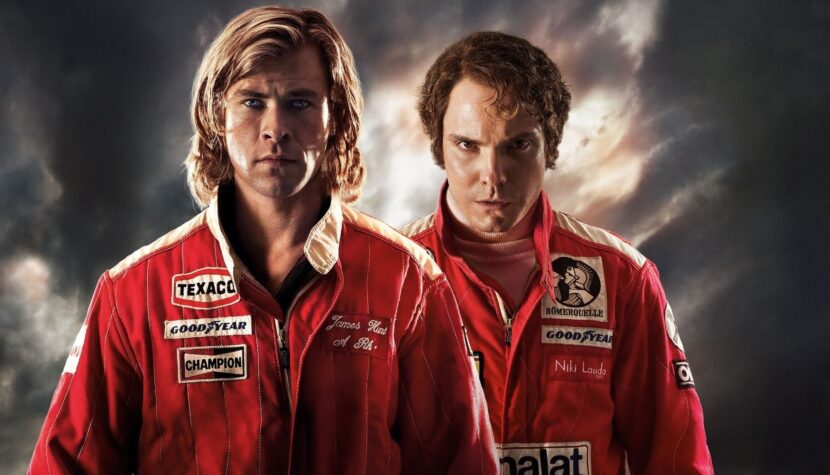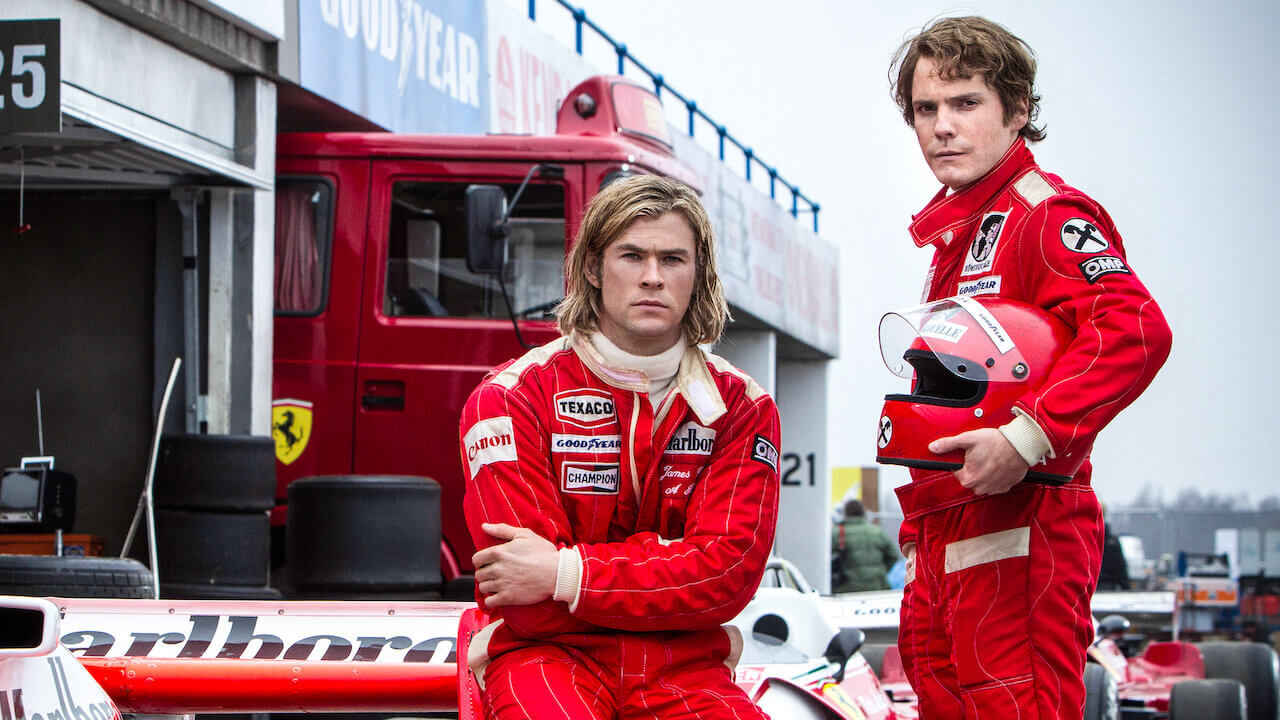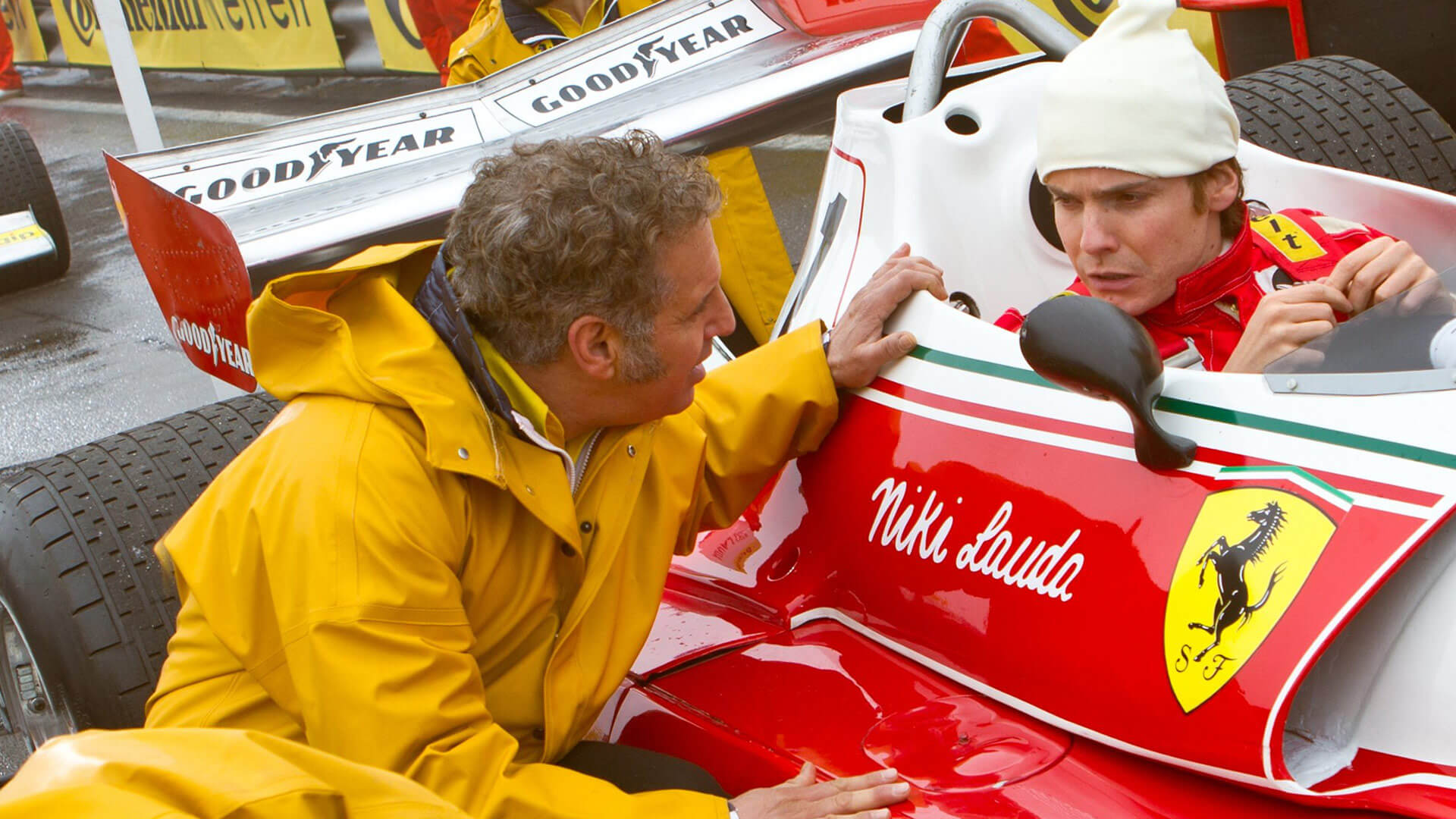RUSH. Hemsworth and Brühl in a film reminding us that sports cinema can still surprise

I like Ron Howard for his diversity. He is one of the few directors who seem to want to excel not only in every genre but also in every possible variation of it – he has already directed romantic comedies, fantasies, dramas, biopics, disaster movies, action films, fantasy, children’s films, even touching on the Wild West and the literary world of Dan Brown. “A Beautiful Mind,” winner of 4 Oscars, effectively combining psychological drama with a paranoid thriller, is considered his greatest success, although personally, I prefer the magical “Willow” and the suspenseful “Ransom.” He doesn’t always succeed, but he can quickly cover up any failures with his next, completely different picture. He is a hardworking creator (a film on average every 2 years, sometimes more often), whose style is impossible to recognize because it changes depending on the story being told.
Starting the screening of “Rush,” I couldn’t help but marvel at how this is Ron Howard’s film – as usual for him, it is devilishly spectacular cinema, but typically American glitz is replaced by European austerity. It’s closer to the restrained “Frost/Nixon” than “Backdraft,” which is evident not only in the visual aspect but also in the narrative style and approach to the subject.
In the 1970s, not only Formula 1 enthusiasts followed with bated breath the rivalry between two famous drivers, Englishman James Hunt and Austrian Niki Lauda. The first, a handsome man who enjoys parties and chasing after women, the life of the party, trying to prove to everyone how much he’s worth. He is portrayed excellently by Chris Hemsworth, who doesn’t limit himself to copying his role from the Thor movies. The latter, with an unassuming, “rat-like” appearance, a fundamental pragmatist who knew about cars like few others but always seemed to be critically disposed towards everything and everyone. This character is played by Daniel Brühl, recently seen in “The Fifth Estate,” and I must admit he is sensational here – he doesn’t try to endear himself to viewers who may have trouble liking his character. Hunt and Lauda met as young drivers and didn’t quite take a liking to each other, with each success of the rival being taken personally, not wanting to be left behind. The peak of their rivalry occurred in the 1976 season, and it is this period that Howard focuses on in his film.

It’s not hard to guess what interested the director of “Apollo 13” in this project. Car races themselves don’t necessarily have to be attractive, and one must work hard to be able to show them attractively on the big screen. John Frankenheimer did this excellently with “Grand Prix,” but that was almost half a century ago! Later, there was Tony Scott with “Days of Thunder” (good job) and Sylvester Stallone with his “Driven” (let’s not even talk about it). Unfortunately, the stories they told were not even remotely as captivating as the races themselves. With Howard’s film, it’s different – ingeniously realized car races are fast, although (except for the final one) short; they are rather a necessary addition to the story of Lauda and Hunt’s relationship than the main attraction of this sports drama.
The main characters are portrayed as talented individuals, capable of overcoming external obstacles and their own weaknesses to achieve their goals. They differ in character, appearance, way of thinking and driving, and even in their approach to the sport. For Hunt, speed and being in the spotlight matter, but perhaps admiration from others the most. He wants to be appreciated. He is willing to take risks on the track because he knows that’s the only way he can win. Lauda, on the other hand, is convinced of his greatness and superiority over the other drivers, which allows him to resign from the race. He says he only drives for money, but it’s clear that, like Hunt, he loves the sport. Perhaps that’s why both of them closely follow their rival’s actions because despite their differences, they have a lot in common, and jealousy of the other’s successes in this case carries the signs of praise. It’s significant, therefore, that a serious accident occurs when the Austrian abandons his coolness and calculation and starts imitating the Englishman.
Similar to the earlier film, “Control,” about the vocalist of Joy Division, screenwriter Peter Morgan sketches portraits of two drivers, still looking for points of convergence, not allowing them to break free from the presence of their competitor, as if both were connected by some invisible thread. Just like in Morgan and Howard’s previous joint project, “Frost/Nixon,” the meeting of such strong personalities leads to a duel, but during it, a strange bond is born, and the initial dislike turns into fascination. The great merit of both the director and the screenwriter is giving voice to both sides; there is no division into good and bad, better and worse, even if history has already decided on that.

The earlier film was about a television program during which British showman and host of a popular talk show, David Frost, had the opportunity to talk to the then former American president, Richard Nixon. Both had a lot to gain from this conversation, but also a lot to lose – there could only be one winner. “Rush” tells a similar story. The type of duel is different, and the spectacle of the whole story is added here, but there are more similarities because both films concern real people and events, are set in the 1970s, and are so distinctly British. Thanks to this, “Rush” can be considered a thematic and stylistic companion to “Frost/Nixon.”
Howard’s film is a pleasant reminder that sports cinema can still surprise. “Rush” seemingly doesn’t break any molds, but it also doesn’t fit into any, avoiding straightforward answers to the question of who was the greater winner in the Hunt/Lauda rivalry. I don’t think it was the creators’ intention to take sides with either of them. After all, the story described by Howard’s work unfolds when both these drivers were at their best. The final off-screen monologue (completely unnecessary) only adds certain things, reminding us of the sad truth that the deceased have no voice.

